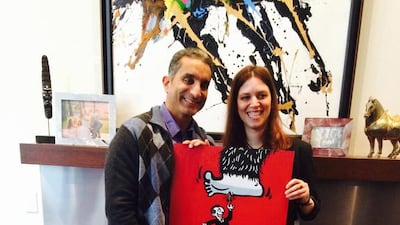Sara Taksler, a senior producer on The Daily Show with Jon Stewart, had never heard of the Egyptian satirist Bassem Youssef until he visited her programme's New York studio in 2012.
The day proved to be inspirational – Taksler has spent much of the three years since then secretly filming Youssef, the host until last year of the Egyptian satirical show Al Bernameg, and his team at work in Egypt.
Now she has launched a crowdsourcing campaign to raise funds to complete the resulting documentary, Tickling Giants.
"I met Bassem in the spring of 2012," she says. "He and a few staff members visited The Daily Show with Jon Stewart before their show went before a live audience. They observed us for a couple of days and at the end of the first day I was in awe of how they do what I do, but with such higher stakes.
“So, that day I asked Bassem if I could make a documentary about his show and he said: ‘Yes’. Since then, Bassem has become a much more familiar face around the office. There is a mutual respect. We do the same thing and speak a similar language in terms of satire.”
Youssef may have flown under Taksler’s radar until their meeting, but he was already a familiar figure to many in the Middle East and North Africa – to comedy fans, political commentators and senior members of the Egyptian governments that had tried to censor his work. He was widely regarded as the “Egyptian Jon Stewart”.
Youssef was initially inspired to launch a YouTube satire show after treating the wounded in Tahrir Square in his former career as a heart surgeon. It was an instant hit and he was quickly picked up by ONTV, then CBC and, in February last year, by MBC Masr after CBC bowed to political pressure and cancelled the show.
But in June, Youssef announced that the show was to end, saying that he was tired of “worrying about my safety and that of my family”.
By then, Youssef had become one of the most famous faces in the region. He was named one of Time magazine's 100 Most Influential People in the World for 2013, and regularly pulled in 30 million viewers an episode.
Taksler admits that she had no idea how popular Youssef was about to become when she had the idea of making the documentary about him.
“When I asked Bassem, the day we met, if I could make a film about him, I certainly didn’t realise he was about to become one of the most famous people in the world,” she says. “I just thought, a doctor becoming a comedian would be a really interesting and funny lens through which to explore the Arab Spring.”
Taksler is quick to praise Youssef for what he has done, yet she modestly glosses over the fact that by travelling to Egypt to film, she was putting herself in a dangerous position. Foreign journalists have not been exempt from recent government clampdowns.
“I was scared to go to Egypt, especially since I couldn’t afford to bring a crew that I know with me,” says Taksler. But when Youssef was called in for questioning regarding jokes made about the government, she says she knew she had to take the risk.
“I didn’t want to not do something that I think is important out of fear,” she says.
“I first went to Egypt in 2013. The US government was discouraging travel, but people I spoke with in Egypt seemed to think it would be fine, as long as I didn’t actively try to film in protests.
“I hired a local crew, which made things easier, in the sense that they are experts on shooting in Cairo. Of course, our intentions were good – simply to tell a story honestly – but some people were suspicious of the cameras and worried about being filmed.”
Despite the US government warnings, Taksler says she felt completely at home in Egypt, particularly in the Al Bernameg office and never felt she was in real danger.
“I loved Egypt and the people,” she says. “I wished I had more time to be a tourist and really explore the country. I would really like to see the White Desert some day.”
She admits, however, that the visit did have its uncomfortable moments.
“One night, I nervously spoke on the phone to Bassem, telling him how concerned I was that, for 15 minutes, a man had been staring at me and following me around the hotel,” she says. “Bassem calmly assured me: ‘He wants you, baby.’ I learnt that there are different cultural norms when it comes to flirting.”
With the secret filming complete, Taksler hopes to raise US$400,000 (Dh1.47 million) for further production costs.
“We’re trying to raise $150,000 of that through crowdfunding,” she says. “This will be an exclusive documentary about Bassem’s experience and that of his staff and fans. This will be a funny film about a serious issue and a Cinderella story gone awry.
“If everyone who wants to see the film can give a little bit, it’s possible to get it done. Documentaries rarely make a profit, so it’s hard to get investors. But, many people are documentary fans, so it makes sense to assemble those people, offer them some incentives [like your name in the film credits or Youssef recording a voicemail message for you], and ask them to help spread the word.
“The Indiegogo campaign will be running until March 10 and donations of all sizes are welcome.”
• For more information or to make a contribution, visit www.indiegogo.com/projects/tickling-giants--2
cnewbould@thenational.ae

